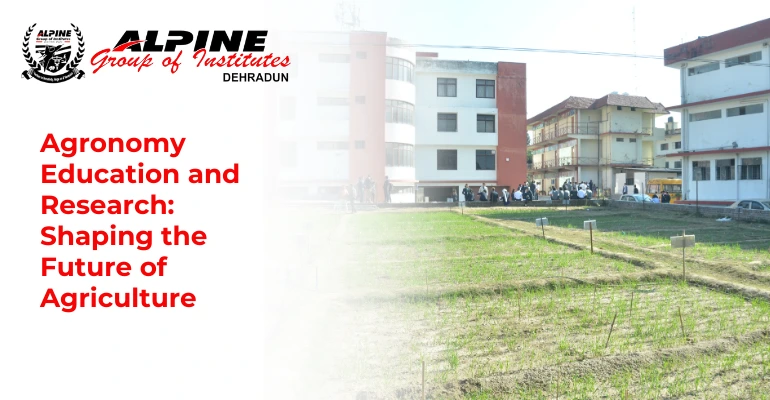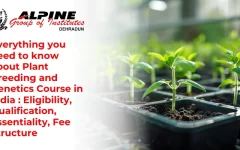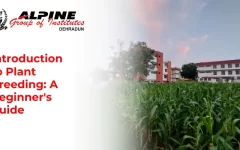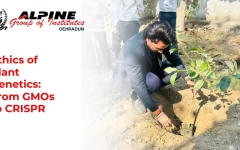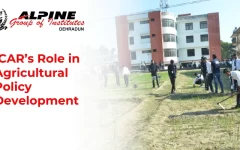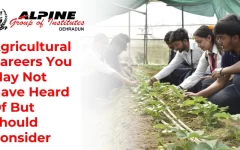Agronomy Education and Research: Shaping the Future of Agriculture
2024-12-16 7:57Agronomy Education and Research: Shaping the Future of Agriculture
Agronomy, the science of soil management and crop production, is at the heart of the global agricultural system. With the world’s population set to exceed 9 billion by 2050, the demand for food will increase dramatically. To meet this demand, agricultural practices must evolve. This is where agronomy education and research play a crucial role. They not only prepare the next generation of farmers but also provide innovative solutions to the challenges faced by modern agriculture.
The Importance of Agronomy Education for Future Generations of Farmers
Agronomy education is more critical than ever. Traditional farming practices, while still foundational in many parts of the world, are increasingly being replaced by advanced techniques that require a deeper understanding of plant biology, soil science, climate patterns, and modern technology. Farmers today need to be equipped with the skills to adapt to rapid technological advancements and the challenges of climate change, resource scarcity, and market demands.
- Bridging the Knowledge Gap
Agronomy education provides farmers with the knowledge to make informed decisions that optimize crop yields, improve soil health, and reduce environmental impact. Universities, colleges, and vocational programs offer courses in plant breeding, pest management, soil chemistry, and climate resilience. These programs train students not just in theory but in hands-on practices through field-based research, lab work, and internships on real farms.
- Embracing New Technologies
Modern agriculture is increasingly dependent on technology. From drones and satellite imagery to automated tractors and precision irrigation systems, agronomy education incorporates training on these innovations. The next generation of farmers must understand how to utilize data, artificial intelligence, and sensor technologies to make their farms more efficient and sustainable. Without this education, young farmers may struggle to compete in a world where tech-driven solutions are the norm.
- Sustainable Practices for the Future
Agronomy education also emphasizes the importance of sustainability. As we face soil depletion, water scarcity, and biodiversity loss, future farmers need to be equipped with the knowledge of how to grow food without compromising the planet’s health. This includes the study of crop rotation, conservation tillage, and integrated pest management. Educating farmers in sustainable practices ensures that they can farm in harmony with nature, benefiting both the environment and their own bottom line.
Innovations in Agronomy Research: From Lab to Field
Agronomy research is continually pushing the boundaries of what’s possible in crop production, soil management, and pest control. These innovations not only increase food security but also help mitigate the negative impacts of agriculture on the environment.
- Advances in Plant Breeding
One of the most exciting areas of agronomy research is plant breeding. Scientists are developing crops that are more resistant to pests, diseases, and extreme weather conditions. For example, genetically modified (GM) crops such as drought-resistant maize and pest-resistant cotton have already had a significant impact on food production in regions vulnerable to climate fluctuations.
Additionally, CRISPR gene editing technology is opening up new possibilities for crop improvement. This technology allows scientists to make precise modifications to plant genomes, which could lead to crops with enhanced nutritional content, faster growth cycles, and better resistance to environmental stress.
- Soil Science and Carbon Sequestration
Soil is the foundation of agriculture, and recent advances in soil science are changing how we understand and manage this precious resource. Research on soil microbiomes like- communities of bacteria, fungi, and other microorganisms living in the soil, is showing that a healthy soil ecosystem is key to sustainable farming. Understanding these complex systems can lead to better management practices that improve soil fertility and structure, reduce the need for chemical fertilizers, and boost crop yields.
Moreover, soil is increasingly seen as a tool for combating climate change. Agronomy research on carbon sequestration is looking at how farming practices can store carbon in the soil, helping to offset greenhouse gas emissions. Techniques such as no-till farming, agroforestry, and the use of cover crops can increase soil organic carbon, making agriculture part of the solution to the global climate crisis.
- Integrated Pest Management (IPM) and Biological Control
With the rise of pesticide resistance and concerns over chemical residues, agronomy research is focusing on alternative pest management strategies. Integrated pest management (IPM) combines biological, cultural, and mechanical control methods with limited use of chemical pesticides to manage pest populations sustainably. Researchers are developing new biological control agents, such as beneficial insects and microbial products, that can target specific pests without harming other species or the environment. - Precision Agriculture
Another exciting development in agronomy research is precision agriculture. By using GPS, sensors, and big data analytics, farmers can now monitor crop health, soil moisture levels, and nutrient needs in real-time. This allows for targeted interventions that reduce waste, improve yields, and minimize environmental impact.
How Agronomy Can Help Combat Global Hunger
Agronomy plays a pivotal role in efforts to alleviate hunger around the world, particularly in developing countries. As climate change, soil degradation, and population growth put increasing pressure on global food systems, agronomists are at the forefront of finding solutions.
- Increasing Crop Productivity
Agronomy research focuses on developing crop varieties that are more productive, disease-resistant, and capable of thriving in harsher environments. In many regions, especially in sub-Saharan Africa and South Asia, farmers struggle with low yields due to poor soil quality, drought, and pests. Innovations in drought-tolerant crops, improved irrigation techniques, and better pest control are helping farmers grow more food on less land, which is crucial for feeding a growing population. - Enhancing Food Security through Sustainable Practices
Sustainable agronomy practices such as agroforestry, organic farming, and conservation tillage are helping smallholder farmers in developing countries improve their food security. These methods not only increase crop yields but also help protect the environment. For example, integrating trees with crops in agroforestry systems can improve soil fertility, provide shade for crops, and reduce the risk of soil erosion. - Empowering Farmers with Knowledge
Education and research go hand in hand when it comes to combating hunger. By providing farmers with the knowledge of better farming practices, crop management, and pest control, agronomy education enables them to adapt to changing conditions and improve their productivity. In many developing countries, agricultural extension services conduct programs that provide training and resources to farmers which are essential for spreading new agronomic knowledge and practices. - Nutrition Security
Agronomy can also help address malnutrition, which is a key component of global hunger. Through biofortification, the process of increasing the nutritional value of crops through breeding or genetic modification, agronomists are working to produce crops with higher levels of vitamins and minerals. Crops like golden rice, which is enriched with Vitamin A, and iron-fortified beans are helping to tackle micronutrient deficiencies in developing countries.
Conclusion
Agronomy education and research are essential to ensuring that the next generation of farmers is prepared to meet the challenges of modern agriculture. By advancing our understanding of plant breeding, soil science, pest management, and sustainable practices, agronomy research is providing the tools needed to boost food production and combat hunger, especially in developing countries.
As the world continues to face the pressures of climate change, population growth, and food insecurity, agronomy will be at the forefront of innovative solutions. Through a combination of cutting-edge research, sustainable practices, and education, we can ensure a future where food is abundant, nutritious, and accessible to all.


